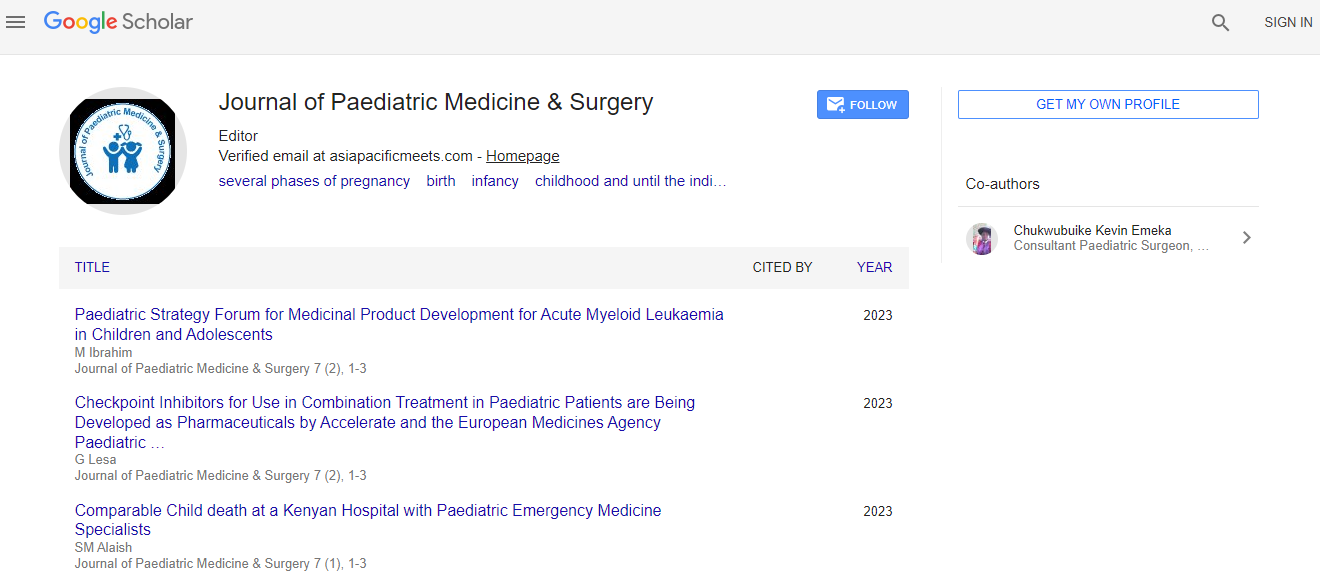Pediatrics Health 2020: Evaluating different stressors in pediatric patientsâ parents - Mimoza Canga - University Ismail Qemali Vlora
*Corresponding Author:
Copyright: © 2020 . This is an open-access article distributed under the terms of the Creative Commons Attribution License, which permits unrestricted use, distribution, and reproduction in any medium, provided the original author and source are credited.
Abstract
Purpose: The aim of this study was to evaluate influencing stress factors, in parents of hospitalized children. The pediatric hospital is an environment with a high level of stress for most parents. Parents experience high levels of stress if their children are hospitalized due to the fear for the loss of their child's life. The objective of this study was to evaluate stress factors in parents of hospitalized children. This study claims that parents of hospitalized children experience stress from different stressors such as dental visits, waiting for the diagnosis, and sleep bruxism. There are other factors which do not influence parental stress including residence, divorced parents, and hospital conditions. The pediatric ward is an environment with a high level of stress for most parents. In the hospital, family members tend to depersonalize themselves as they need to conform to the rules set by the hospital institution. During the 1st days of hospitalization, parents experience the highest levels of stress, but in the following days, they feel a reduction of it. Stress, anxiety, fears, and worries, caused by the hospitalization of children, accompany not only parents, but the whole family. Communicating to the parents that their children have to be hospitalized is a state of alarm and worry because parents think that something bad is going on with their children. Hospital procedures, such as examination of vital signs, blood tests, and other tests, cause anxiety to the children, as well as to their parents. Different studies claimed that parents of children with health problems were twice likely to report depressive symptoms, anxiety, and poorer overall health, compared to parents that have healthy children. In a more recent study, it was reported that half of the parents of hospitalized children, who had threatening illnesses, suffered from acute stress disorders and had depression symptoms. Pediatric patients can be defined as individuals under the age of 18 that are treated with different medical treatments. Other researchers arrive at a conclusion that hospitalization has a negative impact on children's cognitive, psychological, and emotional development, specifically on children in nonfamily settings. Parenting stress consists of a series of complex and dynamic processes related to child behaviors, perceived demands on parenting, sources of parenting, the quality of parent–child relationship, as well as the connections with other people outside home. After analyzing 3450 studies’ abstracts, researchers concluded that parents of hospitalized children experienced psychological symptoms such as stress, anxiety, and depression.
Objective: To analyze the correlation between different stressors, age and gender.
Material and method: This study was conducted in the time period January-July 2019, in the General Pediatrics Department at Fieri Regional Hospital. The sample was composed by 200 parents, where 86 (43.3%) were males and 114(56.7%) were females. The parents chosen as our sample had their children hospitalised for at least 5 days. They were willing to participate and completing the questionnaire given, without any hesitation.
Statistical analysis: The p≤0.05 values were considered significant.
Results: The majority of participating parents were females (56.7%), while the remained were males (43.3%). Most of the sample (45%) was 26-30 years old. 55% of parents had symptoms of depression originating from insomnia. 30% stated that they slept at work from insomnia. 14% of parents of hospitalized children were treated with insomnia medications and a high percentage of parents (86%) were not treated. The sample (23%) reported that they had cardiac rhythm disturbances, during their children hospitalization. Another data collected, showed that 80% of the sample was stressed out by waiting in the hospital, whereas 42% of them felt stressed also by child’s oral problems. Parents of hospitalized children (83%) felt stressed about the painful techniques applied to their children. Most of the parents (65%) were stressed out by the hospital environment. Child´s sleep bruxism was considered as another stressor by 39% of the parents. The correlation between the two variables, age and sleep bruxism was statistically significant (P-value = 0.001). The correlation was statistically significant also between arrhythmia, age and gender with: P-values= 0.03 and 0.04, respectively. Age and child’s oral problems showed a moderate statistically significance (P-value = 0.04).
Conclusion: As a conclusion, this study can claim that parents of hospitalised children experience stress from different stressors such as: insomnia depression, dental visits, waiting for the diagnosis, sleep bruxism. There are other factors, which do not influence parental stress, some of these are: residence, divorced parents, lack of heat in the hospital, etc.

 Spanish
Spanish  Chinese
Chinese  Russian
Russian  German
German  French
French  Japanese
Japanese  Portuguese
Portuguese  Hindi
Hindi 